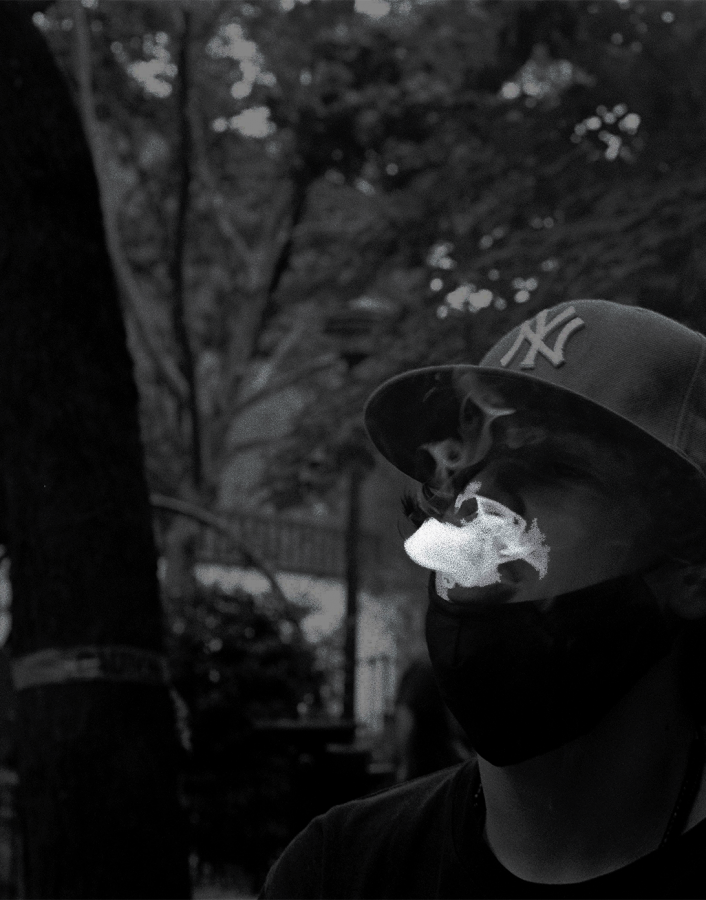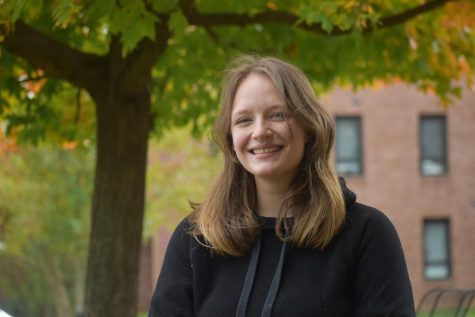Substance abuse in the Covid era
Since the COVID-19 pandemic began, people have turned to substances to ease anxiety and boredom.
January 6, 2021
John Doe* sleeps in the living room of the Queens apartment he shares with his father. His dark hair is messy and overgrown, perhaps a product of Covid restrictions, and he immediately apologizes for its unkemptness. He is wearing a Star Wars t-shirt and talks about the new music he’s discovered in the past few months.
When the pandemic began, Doe was about to begin community college classes, but now, being immuno-compromised, is socially distancing.
“I was, probably in the most stable place in terms of substance use, since I’d started using substances when I was younger,” he said.
Pre-Covid, Doe was drinking only socially and stopped smoking entirely. However, since March, when New York went into its first lockdown, he has begun using multiple times a week, often by himself.
Doe said, “All of my coping mechanisms require being with people. All the hobbies I have, I can’t really do by myself. So when I’m by myself. I find myself using more, drinking or smoking more, because I don’t have other coping mechanisms. I end up relying on less healthy ones.” He continued, “It’s definitely something that makes getting through the day easier.”
Doe has noticed his mental health has worsened since the pandemic, as the isolation has proven to be a physical and emotional barrier for him.
He said, “It’s hard for me to tell if my mental health is worse because of Covid, [or substances]. I get more depressed, and if you wake up and you’re hungover, then you automatically have a bad start to the day.”
Substances to Cope
Doe is not alone. During the pandemic, a CDC survey found that 13.3 percent of adults that responded reported struggling with new or increased substance use.
Dr. Marilyn Sibery, who specializes in substance use disorder and works with 15 to 20 patients in her Westchester private practice, has noticed a significant increase in drug and alcohol abuse within her field.
“I’m seeing people who have alcohol use disorders who maybe were managing before Covid, and now they’re just drinking a lot more. Substances are used as a way to cope. It’s not an effective overall coping mechanism, but definitely in the beginning, it might feel like it is. And it might help ease that anxiety or depression or loneliness, but it usually starts to take on a life of its own,” she said. “People are filling the space that’s been left by Covid with more substances, both in quantity and in kinds.”
Dr. Lorenzo Leggio of the National Institute of Health noted that this increased drug use was becoming a pattern in an NPR interview.
“We know from previous traumatic events, [Hurricane] Katrina and 9/11, people who survived some of them developed alcohol use disorder relating to the increase in stress,” he said.
Stefanie Carbone, student assistance director at The Masters School, also uses the word “trauma” to describe the collective experience of the coronavirus epidemic.
“Certainly over the first several months when Covid came out there was a lot of talk about isolation and the unknown, but there’s [also] a lot of talk about trauma,” she said. “As human beings, we don’t do very well with change. We’re wired to plan, we’re wired for some kind of predictability. And all of a sudden, very quickly, a lot of predictability and routine was taken away.”
Carbone emphasized that all kinds of trauma and stress––from major changes, like losing a job or a loved one, to changes in our day-to-day schedules––could lead to an increase in substance use.
“The sudden isolation and the sudden unknowns can be very scary for people,” she said. “People traditionally use substances as a way to escape or to cope… under stress we tend to regress.”
Considering that marijuana is now fully legal in fifteen states and D.C, Sibery noted that substances have probably gotten easier to access. She added that in the Covid economy, people might resort to selling drugs to make money, especially considering the higher demand for substances in isolation.
Doe also noticed it was easier for him to purchase marijuana since the pandemic began, saying “There’s a market for just wanting to chill at home,” referring to the stress-relief marijuana might provide.
Access to Care
COVID-19 has not only amplified substance abuse, co-occurring with mental health disorders, but it is now harder to access care. The CDC’s question and answer page for those who use drugs during COVID-19 reflects the sincere distress users might feel about their addictions coupled with pandemic anxiety, as well as the lack of certainty and explicit advice available.
“Am I at a higher risk for COVID-19 infection if I use drugs?” – “We do not know yet.”
“What should I do if I have substance use disorder and no longer have access to my treatment program?” – “Discuss this concern with your current healthcare provider.”
“I am using drugs and want to stop, but I am afraid to seek help because of COVID-19. What should I do?” – “Fear and anxiety about a disease can feel overwhelming for some people.”
Users have not necessarily given up on seeking help. Rather, COVID-19 has made it that much harder to pursue recovery and take it seriously. Carbone notes that treatment centers are so inundated that there are waiting lists, both due to high demand and a lower patient capacity in order to adhere to distancing guidelines. Additionally, private therapists’ remote sessions may be limited to a certain number of patients.
There are also financial barriers to seeking care: an estimated 10.1 million people will lose coverage by 2021 due to a job loss in the family related to coronavirus according to an Urban Institute report. Without insurance, out-of-pocket costs can make treatment for substance abuse out of reach.
Sibery emphasized the mental barrier as well.
She said, “You’re already feeling very vulnerable, you’re feeling ashamed. Reaching out for help is already baseline, a very difficult thing to do. Now imagine you can’t see someone in person. The first time you meet them is over Zoom, and you’re going to spill your guts about some of the most painful things, you can imagine: that’s a barrier. COVID is a barrier. Telemedicine is a barrier.”
Change in Relationships
Carbone believes that since the pandemic began, people have been more willing to discuss mental and emotional wellness. She noted that this year, there have been more self-referrals, or peer-referrals, to the counseling center than in the past.
“It means that kids are taking agency over their own well being or their friends are looking out for them,” she said. Carbone has noticed that conversations about mental wellbeing are more common and open than in the past. She said, “In the first several months [of Covid] there was so much loss. I think people were able to talk about death and grief a little bit more freely.”
Since the pandemic began, families have had to adjust to working and taking classes from home. Sibery noticed in her practice that substance use might be easier to get away with, because parents and guardians are busy with Zoom meetings and have a greater mental load during the pandemic.
Carbone disagrees, however. She thinks the increased supervision is another relative positive of the COVID-19 pandemic.
She said, “It’s harder for kids to sneak alcohol or to go out and buy weed off the streets, if their parents are watching them a little bit more or they haven’t been allowed to go out.”
Olivia Smith*, a student at Columbus State Community College in Ohio, is back home with her family and hasn’t used drugs in over eight months, and notes that her alcohol use has decreased significantly, because there isn’t peer pressure to participate in drinking culture.
“I intend to keep it this way, because I’ve seen benefits such as my memory, motivation, and energy levels [improving],” she said.
Risk Factors
There is little research regarding the extent to which substance use impacts one’s immune system. Carbone notes that vaping, for example, may lead to underlying respiratory and lung problems. Those who struggle with chronic, long-term and excessive alcohol use are much more likely to develop Acute Respiratory Distress Syndrome (ARDS), according to a study published in the International Journal of Environmental Research and Public Health.
Not all who struggle with substance use are with family or friends, however. Sibery noted that often, users take drugs and drink around friends, which is no longer an option.
“People are just so much more isolated and on their own. So it’s possible that people are overdosing and just dying because there’s no one there… Let’s take alcohol for example– before you might have been drinking and in a group of people, and so there is some measure of safety in numbers. If a lot of people binge drink and someone [passes] out, at least there’s people there to sound the alarm,” she said. “Think about COVID as forced isolation. Anything can be dangerous if you don’t have another pair of eyes on you.”
*Names changed for privacy
Resources
SAMHSA (Substance Abuse and Mental Health Services Administration): 1-800-622-4357
https://www.12step-online.com/
https://drugfree.org/article/covid-19-online-and-remote-resources-for-addiction-support/





